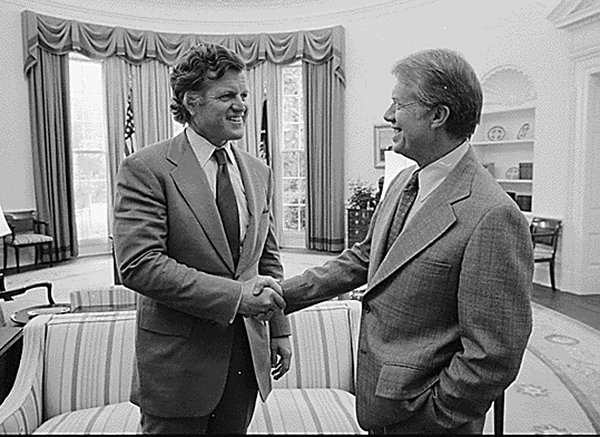-
News >World
FBI reveals more threats to late Sen. Kennedy
2011-08-02 10:52
BOSTON - Newly released FBI documents reveal that threats against the late Sen. Edward Kennedy continued long after the assassinations of his brothers. Sen. Edward Kennedy (D-Mass.) meets President Jimmy Carter in the White House in Washington, D.C. June 26, 1978, in this file photo. [Photo/CFP]
Sen. Edward Kennedy (D-Mass.) meets President Jimmy Carter in the White House in Washington, D.C. June 26, 1978, in this file photo. [Photo/CFP]One of the alleged threats to Kennedy came ahead of a planned January, 1972 visit by Kennedy to Ocala, Florida.
The visit came just four years after Kennedy's brother, the late Sen. Robert Kennedy, was slain in Los Angeles in 1968 and nine years after his brother, the late President John F. Kennedy, was gunned down in Dallas in 1963.
The FBI obtained two letters warning Kennedy against speaking publicly in Ocala.
"It will not be safe for you," one of the letters reads. "Some of us are for you, but big majority are against you. It will only stir the mess you were in with Mary Joe."
The reference is apparently to Kennedy's car accident on Chappaquiddick Island off the coast of Massachusetts in July 1969 that killed Mary Jo Kopechne, a young woman who had been a worker in Robert Kennedy's campaign.
According to a subsequent report in the FBI files, Kennedy arrived in Ocala by private plane and stayed at the home of George Steinbrenner, identified in the report as the owner of the Kinsman Stud Farm.
Steinbrenner, who would go on to buy the New York Yankees the following year, hired "eight to ten men from the Pinkerton Detective Agency to guard Kennedy and party," according to a report sent to the FBI by the Marion County Sheriff's Office at the time.
The sheriff's office also assigned two officers to help protect Kennedy.
The report also warns that "two Ocala women have been attempting to polarize action against Kennedy in the form of a demonstration." One of the women had lost a son in the Vietnam War and held the late President Kennedy responsible, the report said.
The more than 1,400 documents made public by the FBI on Monday also include a June 25, 1968, report of a threat called in from a pay phone at a Coral Gables, Florida, restaurant. The call was overheard by a waitress.
The caller, who identified himself as Sonny Capone, allegedly stated that "If Edward Kennedy keeps fooling around, he was going to get it too."
The FBI reported that a Sonny Capone, "son of the late Al (Scarface) Capone, a notorious hoodlum from Chicago" had lived in Florida as recently as 1966, two years before the phone call.
The report didn't confirm whether the individual making the call was, in fact, Al Capone's son.
Other threats against Kennedy included an anonymous November 1965 call to police in Lynn, Massachusetts, warning that "Kennedy will not reach city hall tonight." Kennedy had several local appearances planned, including a stop at Lynn City Hall.
Another potential threat was called in to the assistant secretary of William F. Buckley Jr., a founder of the modern conservative movement, in October 1969.
The secretary said a female caller phoned Buckley to tell him she lived in South America and had learned of a plot out of Cuba to assassinate Kennedy the following month.
Yet another alleged plot to kill Kennedy was called in to the Cass County, Michigan, sheriff's office in June 1969, warning that the Mafia had sent someone to kill Kennedy.
The documents included more recent threats to Kennedy, including an investigation into the delivery of an envelope filled with white powder to Kennedy's office during the anthrax scare following the September 11, 2001, terror attacks.
The white power was placed in an envelope that included a piece of paper on which was scrawled the message "Freedom Dies With You."
According to the FBI reports, the power spilled out of the envelope as it was being opened by a member of Kennedy's staff at his office in the JFK Federal Office Building in Boston. Hazardous materials teams collected the power, which later tested negative for anthrax.
The reports indicate the FBI interviewed an individual about the letter. The individual told investigators he was a "fan of Kennedy" and "could not think of anyone who was angry with him who might have used his address for such a threat."
More than 2,300 pages of his FBI file were released last year.
The ongoing threats against Kennedy throughout his life underscore how much of target the so-called "liberal lion" of the Senate remained during his 47-year career in the Senate.
Kennedy died in 2009 after a battle with brain cancer.
